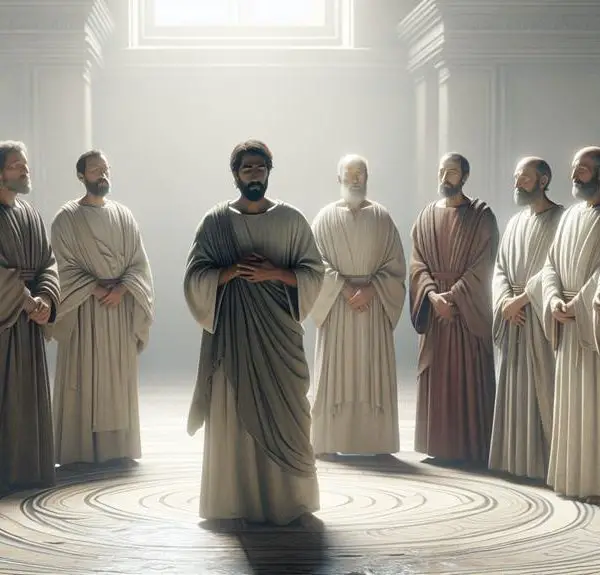Genesis subtly introduces the Holy Ghost, unveiling a profound aspect of divine presence that beckons deeper exploration into biblical mysteries.

First Time Holy Ghost Is Mentioned in the Bible
You might've heard theories about the first mention of the Holy Ghost in the Bible, but have you taken a moment to investigate where it truly begins?
The answer might surprise you, lying subtly within the verses of Genesis, offering a profound insight into the nature of God's Spirit in the early biblical context.
This initial reference sets the stage for a deeper understanding of the Holy Ghost's significance, not only in the Old Testament but as it transitions into the New.
Unraveling this mystery could reshape your perception of the Holy Ghost's role in faith today, sparking a curiosity that demands further exploration.
Key Takeaways
- The Holy Ghost is first mentioned in the opening passages of Genesis, indicating its foundational role in creation.
- This early mention sets the stage for the Holy Ghost's ongoing presence and influence throughout the Bible.
- Understanding the Genesis context is crucial for grasping the Holy Ghost's nature and operations in biblical narratives.
- The Holy Ghost's initial appearance symbolizes God's power and the beginning of divine interaction with the world.
The Holy Ghost Defined

In theological terms, the Holy Ghost, also known as the Holy Spirit, is considered the third person of the Trinity, embodying God's power and presence in the world. This concept, central to Christian belief, emphasizes the Spirit's role in guiding, comforting, and empowering believers. However, modern interpretations of the Holy Ghost have revealed a spectrum of doctrinal differences among various Christian denominations, showcasing the complexity of theological discourse.
The Holy Ghost's nature and operations have been subjects of considerable debate, reflecting broader trends in theological reflection and ecclesiastical doctrine. Historically, the orthodox position posits the Holy Ghost as co-equal with the Father and the Son, a stance that has shaped the creeds and confessions of mainstream Christianity. Yet, modern interpretations have diverged, influenced by scriptural exegesis, philosophical considerations, and the lived experiences of believers.
Pentecostal and charismatic movements, for instance, emphasize the experiential aspects of the Holy Ghost, particularly in terms of spiritual gifts such as speaking in tongues and prophecy. This contrasts with more conservative or traditional denominations that might stress the role of the Holy Ghost in sanctification and moral guidance, without the same focus on charismatic manifestations.
Moreover, doctrinal differences extend to the Holy Ghost's role in salvation and the church. Some traditions advocate a baptism in the Holy Ghost as an experience distinct from and subsequent to conversion, a view not universally held. These differences underscore the multifaceted interpretations that have emerged, reflecting the dynamic nature of theological inquiry and the diverse landscape of Christian belief.
Early Biblical Context

Understanding the Holy Ghost's multifaceted roles and interpretations requires exploring its earliest mentions and contexts within the biblical narrative. You'll find that the concept of the Holy Ghost, or Holy Spirit, is deeply rooted in linguistic origins and shaped by cultural influences, which enrich our comprehension of its significance in biblical texts.
Delving into the linguistic origins, you encounter the Hebrew term 'Ruach,' which signifies breath, wind, or spirit, and the Greek word 'Pneuma,' conveying similar meanings. These terms underscore the Holy Ghost's nature as both life-giving and unseen, akin to the wind. The translation and interpretation of these words through ages have layered the Holy Ghost with nuanced meanings, reflecting the complexity and depth of its role in religious texts.
Cultural influences further illuminate the Holy Ghost's portrayal in the Bible. The ancient Near Eastern cultures, amidst which the biblical texts were written, held a profound understanding of spirit beings and divine intermediaries. These cultural perspectives informed the biblical authors' depictions of the Holy Ghost, embedding it within a context that recognized spiritual forces as integral to the fabric of reality.
Through this lens, you grasp that the Holy Ghost's depiction isn't merely a product of theological abstraction but is deeply entwined with the linguistic nuances and cultural ethos of the times. This backdrop is crucial for a comprehensive understanding of the Holy Ghost's early biblical context, setting the stage for its evolving interpretation throughout biblical history.
The Genesis Mention

You'll find the earliest mention of the Holy Ghost in the Bible within the opening passages of Genesis. This segment presents a critical analysis of the Genesis context, underscoring the Spirit's pivotal role in the act of creation.
It's essential to understand how this early portrayal sets a foundation for the Spirit's ongoing presence and action throughout the biblical narrative.
Genesis Contextual Analysis
Delving into the book of Genesis, we encounter the first mention of the Holy Ghost, setting a foundational precedent for its significance throughout biblical scripture. This mention isn't merely a narrative detail; it's deeply rooted in the ancient Near Eastern creation myths and reflects significant linguistic evolution.
Consider the implications:
- Creation Myths: The narrative aligns with regional myths, yet introduces a unique monotheistic perspective.
- Linguistic Evolution: The terminology used for the Holy Ghost showcases the transition from polytheistic language to a monotheistic context.
- Foundational Precedent: This early mention establishes the Holy Ghost's role in the divine narrative, shaping theological perspectives for millennia.
Through this analysis, you grasp the depth of the Holy Ghost's introduction, appreciating its complexity and foundational role in scriptural tradition.
Spirit's Role Highlighted
In the Genesis account, the Spirit's role is crucially unveiled, marking a pivotal moment in the narrative where divine presence orchestrates creation. This opening sets the stage for an intricate exploration of the Spirit's influence throughout biblical texts and its resonance in modern interpretations. Scholars argue that this depiction not only shapes theological perspectives but also exerts a profound cultural impact.
Aspect |
Significance |
Implications |
|---|---|---|
Genesis Mention |
Introduction of divine presence |
Foundational theology |
Modern Interpretations |
Diverse understandings in contemporary scholarship |
Evolving doctrines |
Cultural Impact |
Influence on art, literature, and philosophy |
Broad societal effects |
Your grasp of these dimensions allows a deeper appreciation of the Spirit's multifaceted role, highlighting the complexity and enduring relevance of biblical narratives in today's world.
Significance in Old Testament

The Holy Ghost's role in the Old Testament demonstrates its foundational significance in shaping the narrative of Divine interaction with humanity. Its presence isn't merely incidental but embodies deep layers of prophetic symbolism and covenant representation, marking it as a pivotal element in the theological and historical landscape of the texts. This significance can be distilled into three key aspects:
- Prophetic Symbolism: The Holy Ghost often appears in contexts that underscore its role as a harbinger of divine truths and mysteries. Its involvement with the prophets, for instance, goes beyond simple inspiration; it signifies a profound connection between the Divine will and the human recipients of its messages. This relationship illuminates the Holy Ghost's function as a conduit for prophecy, making it instrumental in the delivery and interpretation of God's messages to His people.
- Covenant Representation: The Holy Ghost's manifestations are intricately linked with the concept of covenant in the Old Testament. Its presence serves as a sign of God's enduring commitment to His people, symbolizing the unbreakable bond between the Divine and humanity. This facet of the Holy Ghost underscores its role in legitimizing and sustaining the covenants between God and His followers, from Abraham to Moses and beyond.
- Empowerment of Leaders and Prophets: Beyond symbolic roles, the Holy Ghost actively empowers individuals for leadership and prophetic duties. This empowerment isn't arbitrary but is deeply connected with God's overarching plan for His people, ensuring that those chosen to lead or prophesy do so with Divine authority and guidance.
Transition to New Testament

As we shift our focus to the New Testament, we observe the Holy Ghost assuming a more pronounced role in the narrative of salvation and divine interaction. The transition signifies not only a continuation but an expansion of the Holy Spirit's involvement, intricately tied to the establishment of the New Covenant and the dissemination of the Apostolic Witness. This evolution marks a pivotal moment, reinforcing the Holy Ghost's integral role in Christian theology.
Aspect |
Old Testament |
New Testament |
|---|---|---|
Presence |
Subtle, overshadowing |
Direct, indwelling |
Role |
Guidance, prophecy |
Empowerment for mission, witness |
Relationship |
Conditional, specific individuals |
Universal, believers |
The New Testament amplifies the Holy Ghost's role, transitioning from a selective presence to an enduring indwelling within all believers, a cornerstone of the New Covenant. This shift highlights a democratization of the Spirit's presence, moving from the prophets and select individuals to a universal gift for all who believe, thereby bolstering the communal and personal aspect of divine interaction under the New Covenant.
Furthermore, the Apostolic Witness, the firsthand account and teachings of Jesus' apostles, is intrinsically linked to the Holy Ghost. The Spirit empowers the apostles, guiding their teachings and ensuring the authenticity and preservation of the Christian message. This transition underscores the Holy Ghost's pivotal role in the foundational stages of the Church, affirming the Spirit's ongoing presence and influence in the lives of believers and in the collective memory and tradition of Christianity.
Implications for Faith Today

You'll find that the earliest references to the Holy Ghost in scripture lay a foundational understanding critical for believers today.
These passages not only enhance one's spiritual comprehension but also foster deeper, more meaningful connections with the divine.
Furthermore, they serve as a catalyst for personal reflection, encouraging individuals to introspect their faith journey and relationship with the Holy Spirit.
Enhancing Spiritual Understanding
Understanding the first mention of the Holy Ghost in the Bible offers profound implications for contemporary faith, guiding believers in deepening their spiritual comprehension. This foundational knowledge is pivotal for several reasons:
- Facilitates Spiritual Growth: Recognizing the Holy Ghost's role from the outset of scripture emphasizes the importance of spiritual growth as an ongoing journey, not just a destination.
- Enhances Divine Communication: It underscores the Holy Ghost's role in facilitating divine communication, allowing believers to discern and understand God's will more clearly.
- Bridges Historical and Contemporary Faith: It connects believers to their spiritual heritage, fostering a deeper appreciation and understanding of their faith's roots.
Grasping these implications is essential for anyone seeking to enrich their spiritual life and understand the multifaceted ways the Holy Ghost interacts with believers.
Building Deeper Connections
Recognizing the Holy Ghost's initial mention in scripture not only enhances spiritual comprehension but also lays the foundation for building deeper, more meaningful connections in contemporary faith practices. This acknowledgment allows you to delve into the rich tapestry of cultural interpretations and historical perspectives surrounding this pivotal concept.
By understanding the diverse ways in which the Holy Ghost has been perceived and interpreted across different cultures and historical epochs, you're equipped to engage in more nuanced, informed discussions about your faith. Such an approach fosters a more inclusive, empathetic understanding among believers, bridging gaps between various interpretations and traditions.
Ultimately, this deep dive into the historical and cultural contexts enriches your faith journey, encouraging a more interconnected and profound experience of spirituality in today's world.
Encouraging Personal Reflection
Delving into the first mention of the Holy Ghost in scripture invites believers to engage in personal reflection, critically examining how this concept influences their contemporary faith and daily practices.
To deepen your understanding, consider:
- Reflective journaling about moments you've felt guided or comforted by the Holy Ghost, noting the circumstances and your feelings.
- Prayer contemplation to seek further enlightenment and understanding of the Holy Ghost's role in your life.
- Studying scriptural passages related to the Holy Ghost, analyzing their contexts and applications today.
These practices encourage a scholarly yet personal approach to faith, allowing you to explore how the Holy Ghost's first scriptural mention resonates within your own spiritual journey, enriching your daily walk with a deeper, more conscious connection.
Frequently Asked Questions
How Has the Interpretation of the Holy Ghost's Presence Evolved in Non-Christian Religions Throughout History?
You're delving into how non-Christian religions, especially through Islamic perspectives and Hindu interpretations, have viewed the Holy Ghost's presence.
Historically, Islamic texts have often paralleled the Holy Ghost with angelic revelations, emphasizing a divine connection.
Meanwhile, Hinduism, with its rich pantheon, interprets such spiritual entities more broadly, aligning them with various deities and cosmic principles.
This evolution highlights a fascinating interplay between monotheistic and polytheistic understandings of divine spirit.
What Are Some Common Misconceptions About the Holy Ghost's Role in Biblical Narratives Outside of the Mainstream Christian Perspective?
Ironically, you might think the Holy Ghost's role is straightforward in biblical narratives, but misconceptions thrive.
Beyond mainstream Christian views, spiritual symbolism and cultural interpretations diversify its significance. You'll find that the Holy Ghost isn't just a Christian concept; its presence is woven into various religions, reflecting a rich tapestry of beliefs.
Analyzing these perspectives sheds light on the nuanced roles attributed to this spiritual entity, challenging conventional views with authoritative insight.
How Do Modern Linguistic Studies Impact Our Understanding of the Term "Holy Ghost" as Used in the Earliest Biblical Manuscripts?
Modern linguistic studies shed light on how the term 'Holy Ghost' evolved in the earliest biblical manuscripts.
You'll find that linguistic evolution plays a crucial role in interpreting these texts. Experts scrutinize manuscript authenticity to ensure accurate translations.
This analysis reveals shifts in language and meaning over time, affecting your understanding of 'Holy Ghost'. It's a complex process, diving deep into history to grasp the term's original intent and significance.
Can You Provide Examples of How Different Christian Denominations Have Historically Disagreed on the Nature and Significance of the Holy Ghost?
As they say, 'the devil's in the details,' and when you dive into the history of Christian denominations, you'll find deep disagreements about the Holy Ghost's nature and significance.
From Pentecost's significance to Trinitarian debates, denominations have historically clashed. Catholics emphasize the Holy Spirit's procession from the Father and the Son, while Eastern Orthodox churches focus on its procession solely from the Father, showcasing a fundamental rift in understanding and doctrine.
Are There Any Notable Artistic Representations of the Holy Ghost From the Early Christian Era, and How Have They Influenced Contemporary Visualizations?
Yes, early Christian era artworks contain notable symbolic depictions of the Holy Ghost, significantly influencing contemporary visualizations. These artistic representations, often featuring a dove or tongues of fire, showcase the Holy Ghost's presence and power.
This artistic evolution from the early Christian period to modern times underscores the enduring importance of these symbols in visually communicating the Holy Ghost's significance. You'll find these elements deeply ingrained in both historical and current religious art.
Conclusion
In your journey through the scriptures, you've traced the Holy Ghost's presence from a whisper in Genesis to a clarion call in the New Testament. Like a river that starts as a mere trickle in the mountains before growing into a mighty force, the Holy Ghost's role has evolved, shaping faith's landscape.
This evolution underscores the profound, living connection between ancient text and contemporary belief, reminding us that what was once a gentle stream now powerfully sustains and nourishes our spiritual lives.



Sign up